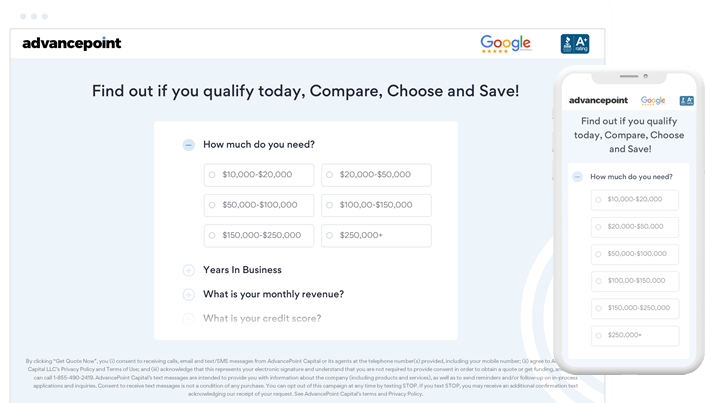
What is Accounts Receivable Financing?
Accounts receivable financing is a form of funding that leverages the accounts receivables to raise capital for company needs such as operating capital, inventory, expansion, and emergency cash flow infusions.
How does Accounts Receivable Financing Work?
Accounts receivable financing can be defined in a couple of ways. This type of financing is structured by an asset sale of receivables from a business either by a small business loan or a business cash advance. The most well-known receivable funding products for financing accounts receivable are Invoice Financing (Factoring), Asset-Based Business Loans (ABL), or a Revenue Based Financing Agreement.
As a go-to accounts receivable financing provider, AdvancePoint Capital can help with a wide range of options and business loans you can rely on. Our seamless user experience puts the power of funds in your hands so that you can manage cash flow problems, expansion, growth, and beyond.

Get Started Today
AdvancePoint Capital makes the loan application process a simple, straightforward experience.
4 Best Accounts Receivable Financing Options (July 2025)

1. Invoice Factoring for Accounts Receivable Financing
This type of accounts receivable financing factoring allows you to get an advance of invoices sent to clients/customers of up to 95% percent outstanding invoices value. An Invoice finance company will advance a set amount at time of issuance of invoice to issuer based on an invoice advance financing agreement and then collect directly from the client or customer for the unpaid portion. This option accelerates the businesses accounts receivable which improves cash flow.
Invoice Financing: Product Overview
- Rates: Factor Rate of 1.50% to 2.75% of invoice amount advanced
- Fees: Typically a monthly service management fee based on volumes
- Credit Standards: Companies that are invoiced will be credit vetted, not the business engaged in the invoice advance agreement.
- Documentation: Low Documentation: 1-page application, accounts receivable aging report, and clients contact information
Benefits and Best Uses of Invoice Financing
Invoice factoring once set up with the invoice finance company and receivable financing factoring accounts, can provide funds in a pinch and allow a company to continue to operate smoothly and pay business expenses. In many cases, factoring companies now have web-based portals that allow business owners to upload invoices in real-time and accounts receivable based financing accounts to get advances deposited in a business bank account. The costs are relatively low compared to the benefits. It’s is a small business lifeline. The main use of invoice advances is for operating capital, and to accelerate accounts receivables invoice value, but there are no restrictions on the use of funds.
2. Asset-Based Lending (ABL)
Asset-based loans (ABL), is a form of business lending that uses the collateral of a business (such as equipment, machinery, and other hard or liquid assets) as consideration of a loan and not rely solely on credit. Traditional options look at revenue, financials, and other indicators first, and collateral second, while asset-based loan programs look at collateral first and revenue second. This method relies on collateral (receivables) to provide financing options. ABL is an option for most companies that have accounts receivable and need cash flow to stabilize there balance sheet.

What Type of Collateral Is Used for Asset-Based Lending?
Asset-backed loans enable companies to utilize a variety of collateral options for security. There is a long list of assets that can be used, but for the purposes of this topic, we are going to focus on the example of accounts receivables like purchase orders and invoices. But make no mistake about it, this will collateralize all business assets if you get an asset-backed business loan.
What Are Asset-Based Lending Rates?
Asset-Based revenue rates depend on the product offered. Commonly rates can be in the form of an interest rate that ranges from 1% to 28.99% or factor rates that range from 1% to 7% of face value. Below is a list of factors regarding your assets and such that can affect your rate.
Asset-Based Financing: Product Overview
- Rates: Interest rates start at 0% and up to 28.99%
- Terms: No term limits, Revolving business Line of Credit
- Fees: No Origination Fees
- Payments: Low flexible monthly payments
- Credit Standards: Good to excellent with deep history
- Documentation: Accounts receivable ledger, outstanding invoices. Easy Application (larger number of requests may require more documentation)

3. Merchant Cash Advance
Merchant Cash Advances, also known as a Revenue-Based Finance Agreement, is an advance of a set amount of money upfront to a business at a discounted purchase price. Unlike accounts receivables, an MCA utilizes incoming daily credit card sales for repayment. The set percentage of credit card processing sales is deducted every time the business batch credit card sales. This feature of repayment is thus not a set term because it's attached to future credit card sales that typically fluctuate.
Merchant Cash Advance: Product Overview
- Rates: Factor Rates between 1.15% to 1.48%
- Terms: Repayment is flexible to future sales with no set term.
- Fees: Funder Fees range from 1% to 5%.
- Payments: A set percentage Split from future credit card processing batches.
- Credit Standards: All credit considered.
- Documentation: 1-page application, 3 months bank statements, and 3 months merchant processing statements.
4. Business Cash Advance
A Business Cash Advance, also known as a Revenue-Based Future Sales Agreement, will advance money to a business based on current revenue with a discounted purchase price to pay back. A business cash advance is paid back by a fixed percentage of future sales, deducted from the business bank account via a convenience ACH payment either daily or weekly that is correlated to the set percentage of future sales.
Reconciliation can occur once a month if the convenience ACH payment exceeds the set future percentage of sales via a refund. This feature is the primary reason that there is no set term because the repayment time frame is based on future sales volumes. Underwriters set up Business Cash Advances to have an estimation of repayment in 6 to 18 months, but the reality is that this is only an estimation, because of sales fluctuations.
Business Advance: Product Overview
- Rates: Factor Rates between 1.15% to 1.48%
- Terms: Flexible based on Revenue
- Fees: Funder Fees %0 to 5%
- Payments: Convenience ACH payment daily or Weekly
- Credit Standards: All credits considered
- Documentation: 1-page application, 3 months bank statements

The fast, convenient, and straightforward way to get the money you need for your small business – now!
Get your quote today by filling out our simple form.
Pros and Cons of Accounts Receivable Financing
The benefits of these accounts receivable financing products allow small business owners who either can’t or won’t provide certain documentation the ability to still get approved for funding.
Unfortunately, for those small businesses that don’t invoice customers for payment on a regular basis, accounts receivable financing is not for you, and you will need to look at other options.
Pros
- Reduced documentation provided for a decision
- Speed-Processing times
- When you are turndown for financial statements. Receivable loans offer a solution.
- A factoring company thinks outside of the box to fund deals.
Cons
- Accounts receivable financing rates may be higher than traditional options
- Fees may cost more than traditional options
- Terms may be shorter in duration
- May not offer as much flexibility
- Loan Amounts may be limited
Accounts Receivable Financing Companies
An account receivable financing company will sign an agreement with you before moving forward with your application. You must read the agreement carefully to understand the terms of lending. While some accounts receivable companies might now accept your application if you have bad credit, some might accept it at higher rates. The following is a list of companies that provide accounts receivable financing:
- Alternative Lenders
- Banks
- Credit Unions
- Factoring Company
- Business Financing Company




